The last king and the last war of independent Macedonia
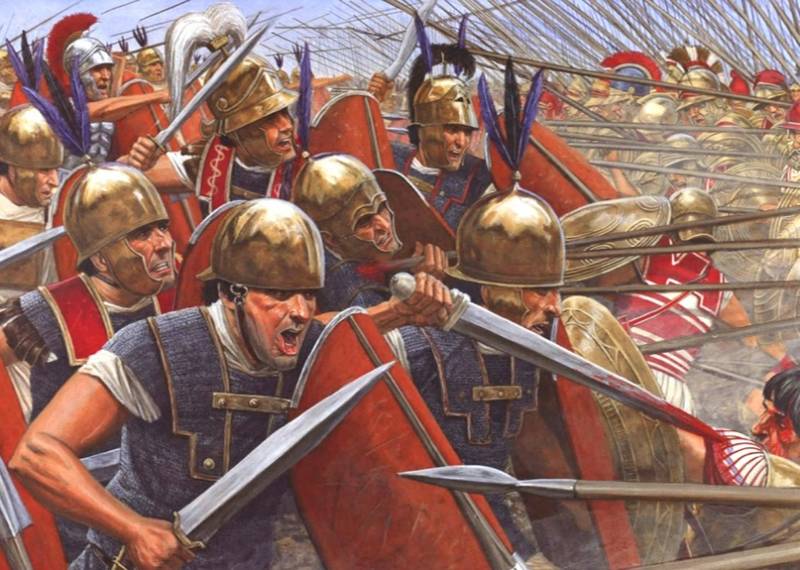
Roman legionnaires in a drawing by Sean O'Brien
In the spring of 336 BC. e. an event occurred that fatally knocked down Macedonia, which was gaining strength. In the capital of the country, the city of Egi, during the wedding celebrations, Tsar Philip II, an outstanding statesman who created an army that had no equal in the world, and subjugated the whole of Hellas to Macedonia, was killed. This happened on the eve of the main campaign of his life - against Persia, which would have ended in the complete triumph of this king and the conclusion of an extremely beneficial agreement with Darius.
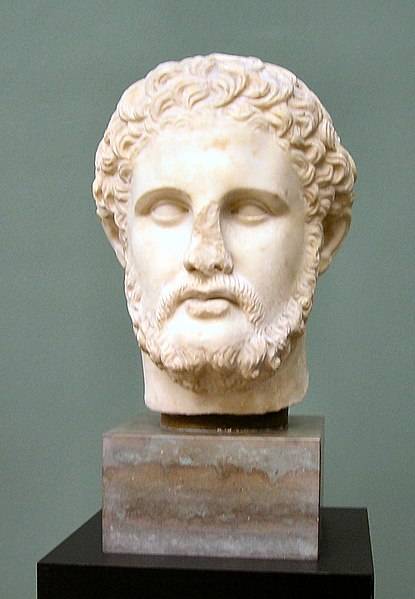
Philip II of Macedon
To his successor, the murdered king left a treasury full of gold, and a whole galaxy of experienced commanders, who had few equals in the surrounding countries. Unfortunately for Macedonia, Philip's heir, Alexander, was himself a great commander, but the king turned out to be useless. As soon as he came to power, he immediately began to implement an insane program of war for the sake of war and conquest for the sake of conquest. He won great victories and reached the banks of the Indus, from where his army, completely drained of blood, with huge losses, barely managed to somehow reach the capital of Gedrosia - Pura. According to ancient authors, only about a quarter of the soldiers who went with Alexander on the Indian campaign returned. Plutarch reports:
The return of Alexander's army from India can be safely compared with the retreat of Napoleon from Moscow - with the difference that the Macedonian king did not leave his troops. And, according to Quintus Curtius, he walked with his soldiers through the waterless desert,
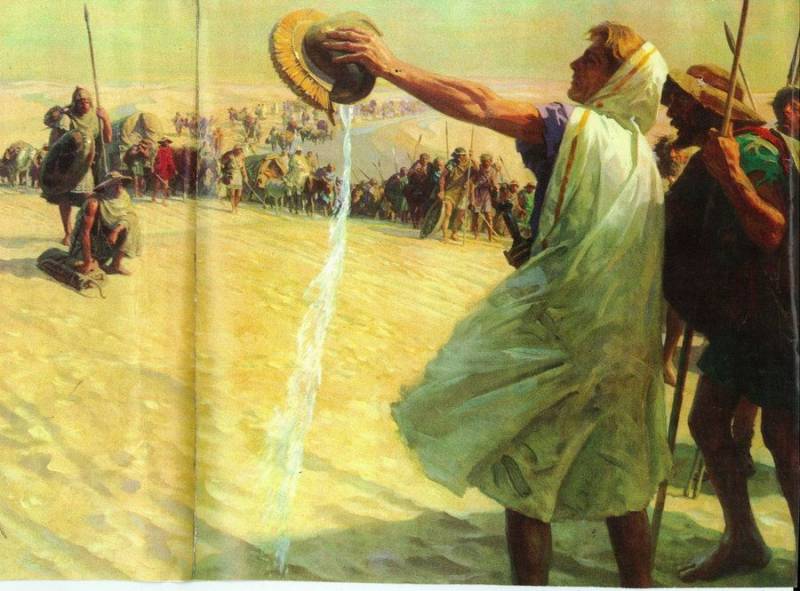
Tom Lovell. Alexander the Great refuses water in the desert
Lovell's painting illustrates an episode of this transition: when a helmet with water was brought to Alexander, he poured it into the sand, saying:
This phrase was then shamelessly "plagiarized" in the novel "The Three Musketeers" by A. Dumas:
Remember?
Let's go back to Alexander the Great.
In June 323 B.C. e., having reigned for only 13 years, the great conqueror died unexpectedly. The most likely cause of death of the 33-year-old king, modern researchers believe West Nile fever.
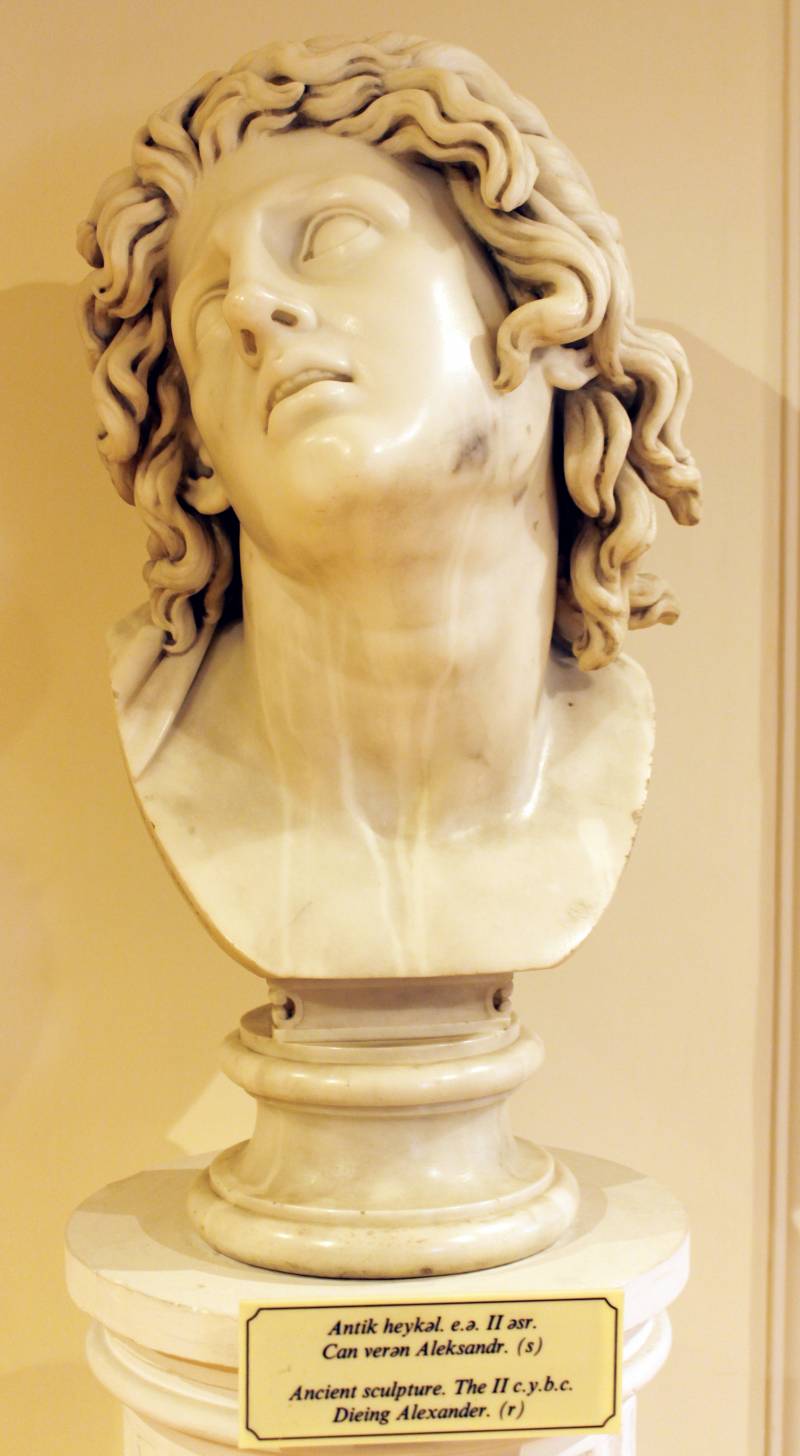
Dying Alexander, work of an unknown sculptor
So the empire of Alexander, which did not have time to form, collapsed. Quite easily conquered territories were now divided with great difficulty and for 20 years. Few of Alexander's closest associates managed to die in their bed.
The fate of the descendants of the great king was terrible. His legitimate heir from Roxana, along with his mother, was poisoned by the order of Cassander, who ruled in Macedonia, and the illegitimate son Hercules (from the Persian Barsina) was killed by order of Polyperchon, the commander of Alexander's invincible phalanx. And the fate of Macedonia was sad, which was “shot down on takeoff” and could not become a great state and the center of the empire, which was quite possible under a more reasonable king.
A huge number of young and strong passionate Macedonians died in the campaigns of Alexander, or remained in foreign lands - in the armies of the Diadochi commanders. Men of the next generations also left Macedonia en masse, which again found itself in the margins of the world stories. They went to the rich states of the Ptolemies or the Seleucids, where they were willingly accepted into the service of the ruling monarchs - the descendants of the commanders of Alexander the Great. The most fortunate made a successful career, holding high positions in the army or at court. The rest simply received a good salary, which they could not hope for in their homeland.
Meanwhile, a new predatory state, the Roman Republic, was gaining strength in the west. The great commander Pyrrhus, so similar in appearance and habits to his relative, the great Alexander, did not have the strength to stop the Romans in southern Italy. Now Rome itself has come to the Balkans. But at first the Romans were busy with the war against their main rival in the Mediterranean - Carthage. Sailing from Sicily, which he had not conquered, Pyrrhus said to his companions:
He was right: it was Sicily that became the main "prize" of Rome following the results of the first war between these states, which lasted from 264 to 241. BC e.
First and Second Roman Macedonian Wars
Before the confrontation with Macedonia, Rome had already won the First Punic War. But the contradictions between these states were not eliminated, and in 218 a new war began, the most famous, during which Hannibal became famous. And in 215, the Macedonian king Philip V, who was still dreaming of the former greatness of his country, began hostilities against Rome.
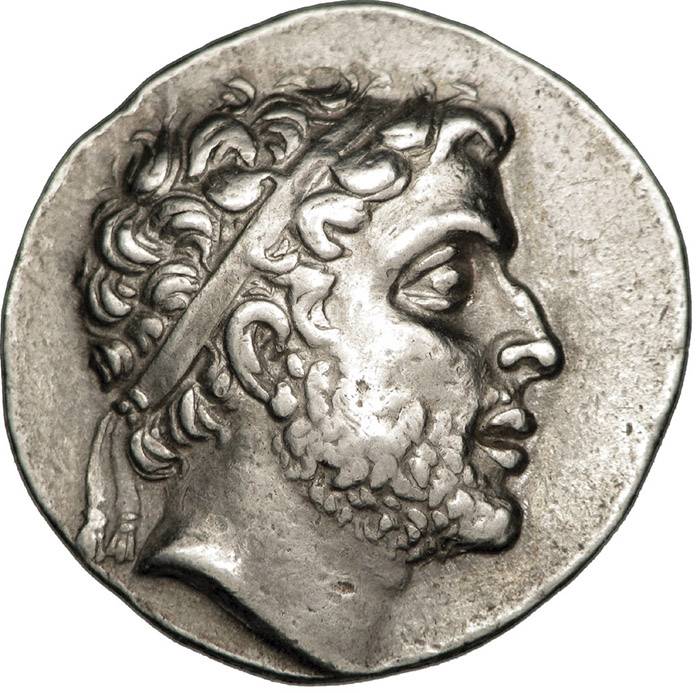
Silver drachma with a portrait of Philip V
Taking advantage of the predicament of the Romans, who could not get rid of Hannibal, who was walking around Italy, he tried to capture Illyria. This, which became the first, the Roman-Macedonian war lasted 10 years and ended in vain. Meanwhile, Philip made an alliance with the Seleucid state, signing an agreement on the division of the overseas possessions of Egypt. And in 202 BC. e. Macedonia attacked the Kingdom of Pergamon.
In 200 BC. e. the new (Second) Macedonian War was already started by Rome, which was supported by the Greek cities of the Aetolian and Achaean unions.
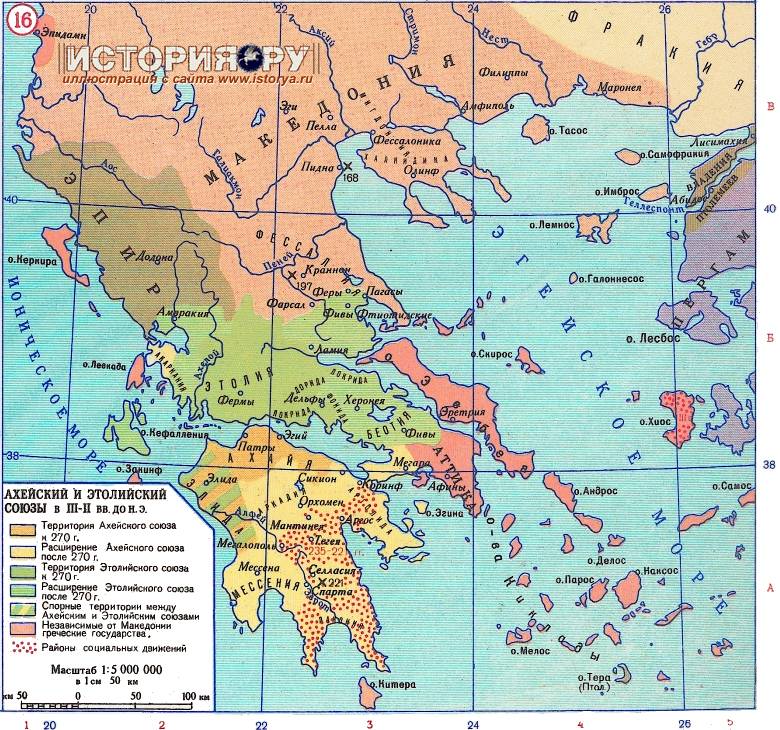
Macedonia, Epirus, Aetolian and Achaean unions of Greek cities
The denouement came in the spring of 197 BC. e., when the Roman general Titus Quinctius Flamininus came to Thessaly with an army of about 33 thousand people. The Romans also managed to bring 20 war elephants here. At a ridge of rocky hills, similar to dog heads (and therefore called Cynoscephali), the Roman army met with the 26th Macedonian army. A battle took place here, ending in a crushing defeat for the Macedonians.
As a result of this war, Philip V lost all territories outside Macedonia, transferred his ships to Rome, paid an indemnity of 1 talents, promised to reduce the army to five thousand people and pledged not to declare war without the permission of the Roman Senate. In 200 BC. e. During the Isthmian Games, the Roman general Titus Flamininus solemnly declared Greece free. As a result of this "liberation", already in 196 BC. e. the cities of the Aetolian League were forced to submit to Rome.
Meanwhile, Philip V found a way out. As we remember, the number of his army was not to exceed five thousand people. About a thousand of these treaty-allowed soldiers were actually instructors who trained a constantly changing contingent: each year four thousand people were recruited and trained, who then went home, replaced by new recruits.
Philip V died in 179 BC. e. The Romans tried to put his son Demetrius, who had lived in Rome for a long time, at the head of Macedonia. However, the Macedonians chose another son of Philip V - Perseus. He continued his father's policy and soon gained great popularity both at home and in Greece.
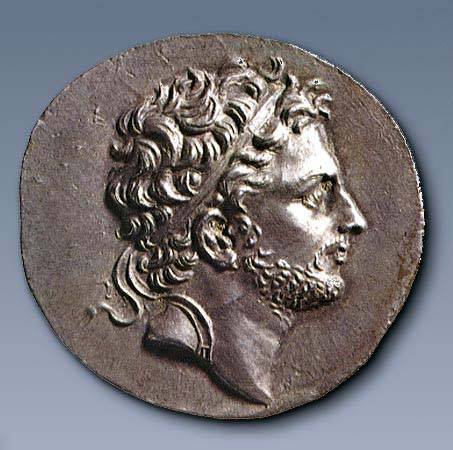
Perseus on a Macedonian tetradrachm
Third Roman Macedonian War
Perseus brought the size of his army to forty thousand people, led anti-Roman agitation in the Greek policies, entered into an alliance with Illyria and Epirus. The Roman Senate quite expectedly accused him of violating treaties, and in the spring of 171 BC. e. a new war began.
One of the reasons for its announcement was the assassination attempt in Delphi on the allied Rome of the Pergamon king Eumenes, who had previously complained about Perseus, urging the Romans to pay attention to his activities. The Macedonians were accused of organizing the assassination, but it was not possible to prove their involvement, but war was declared. The Roman fleet, led by Praetor Gaius Lucretius, blockaded the Macedonian coast. And the ground troops of the consul Publius Licinius at that time landed in the Epirus region of Apollonia. The Greek policies after the appearance of the Roman legions in the Balkans, at best, declared their neutrality, but mostly went over to the side of the Romans.
Nevertheless, the beginning of the war was generally successful for the Macedonians. Initially, they won a battle at the Kallinikos hill near Larissa. Then there were several minor battles, held with varying degrees of success. In 170 BC. e. the Epirus tribes of Molossians and Chaons crossed over to the side of Perseus. The attempt of the Romans to break into Macedonia through the Cambunian mountains was unsuccessful. After that, the Macedonians even ousted the enemy army from Thessaly - and the Romans withdrew to the not yet famous Pharsalus, where many years later the decisive battle between Caesar and Pompey would take place.
The Macedonian army defeated the Dardanians allied to Rome. Praetor Appius Claudius, under whose command were 4 Roman soldiers and 8 soldiers of the allies, was defeated near the city of Uscan. Perseus suggested that Rome conclude a new treaty, but the Romans, on principle, did not enter into peace negotiations after the defeats.
In 168 BC. e. The Roman army was led by the consul Lucius Aemilius Paulus, whose father died in the battle with Hannibal at Cannae. The son-in-law of the new commander of the Romans was the famous Scipio Africanus. His relative Titus Quinctius Flamininus led the Roman troops in the battle with the Macedonians at Cynoscephalae. And the son of Emilius Paul - Publius Cornelius Scipio Emilianus, during the third Punic War, will occupy Carthage and will also receive the agnomen (personal nickname) African.
But back to 168 BC. e.
Allied Macedonia Epirus Aemilius Paul defeated in 20 days. And now the Roman and Macedonian armies were preparing for the decisive battle.
Battle of Pydna

Andrea del Verrocchio. Battle of Pydna
The decisive battle of that campaign and the whole war took place on June 22, 168 BC. e. near the city of Pydna, famous for the fact that in 317 BC. e. the army of Cassander (the son of the famous commander and diadochus Antipater) captured in him the mother of Alexander the Great Olympias, his widow Roxana and his only legitimate son (in honor of his father he was named Alexander).
The most complete description of the battle at Pydna is given in Plutarch's Comparative Lives. Some information can also be found in Livius and Frontinus.
Modern researchers believe that 168 BC. e. 30 thousand Romans met at Pydna (with allied and vassal troops - up to 42 thousand) and 44 thousand Macedonians.
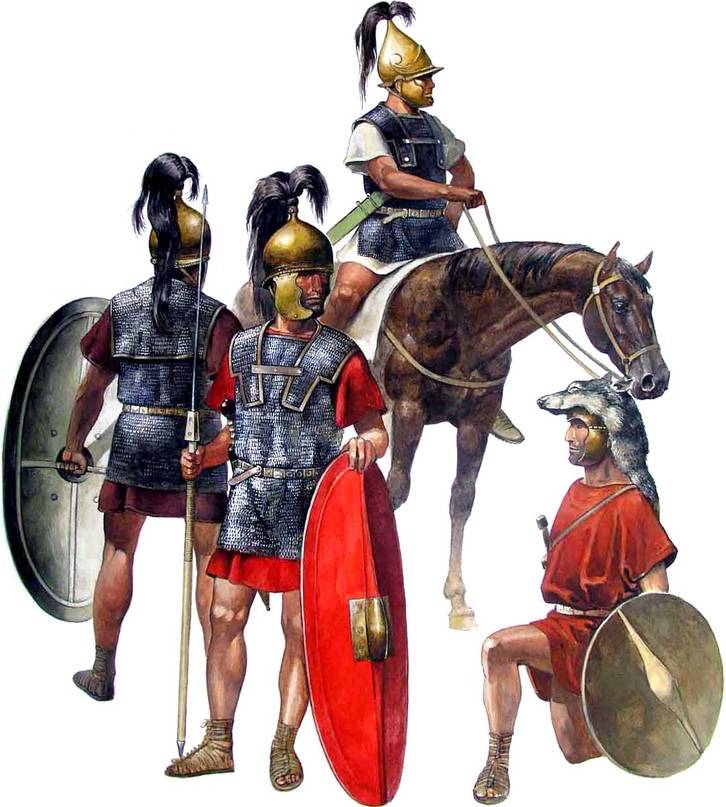
D. Aleksinsky. Roman soldiers at Pydna
And the Romans also had 22 elephants, which were received either from the ruler of the Seleucid state of Antiochus, or from the Numidians allied with Rome.
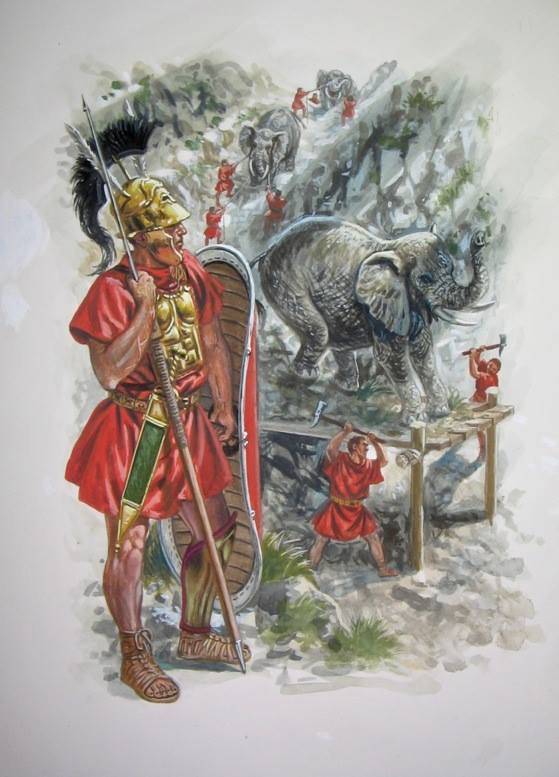
Giuseppe Rava. Romans lead elephants through mountain passes
The day before the battle (June 21) there was a lunar eclipse, which makes it possible to accurately determine its date. In those days, such "signs of heaven" were taken more than seriously, and the eclipse frightened the soldiers of both armies. However, the degree of demoralization of the Macedonians turned out to be higher, since there were “wise men” who interpreted this astronomical phenomenon as a harbinger of the imminent death of the king. Perhaps this circumstance also affected Perseus, who the next day acted indecisively and, having received a minor wound, hurried to leave the battlefield.
The enemy armies were separated by the Levkoe River, through which no one dared to cross for a long time. Finally, the Macedonians crossed the river - and immediately lined up a phalanx.
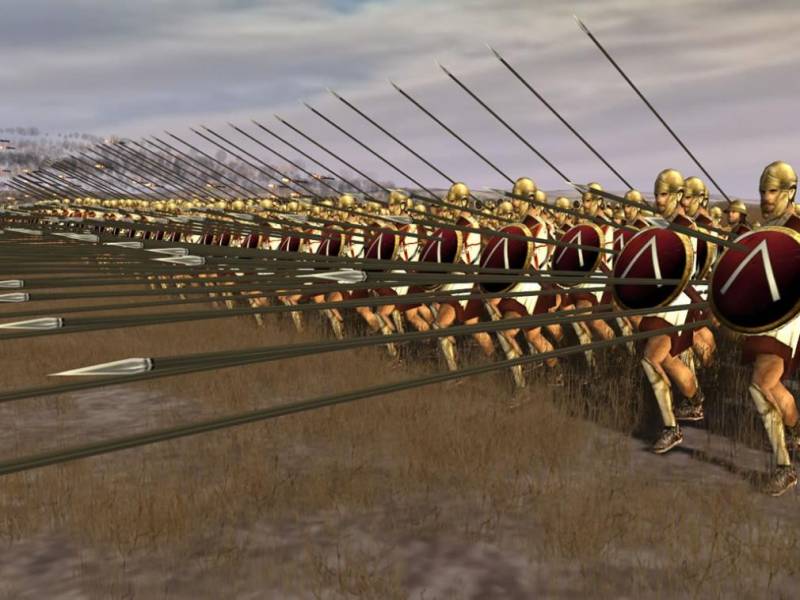
To her left stood the elite XNUMX-strong Agema corps. Light peltasts, mercenaries and Thracians settled on the right flank.
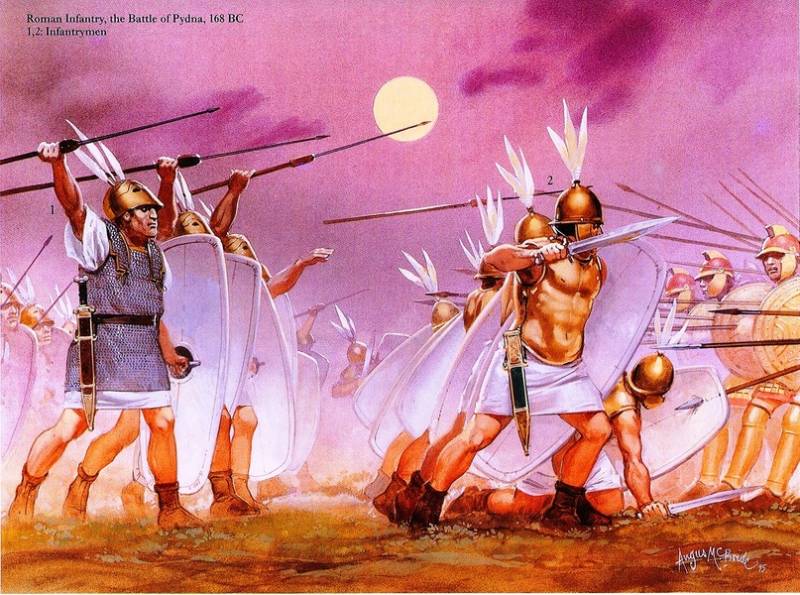
Angus McBride. Battle of Pydna
Before the Macedonians was a plain, bounded on one side by hills, on the other - by the sea.
Schemes of the battle of Pydna:
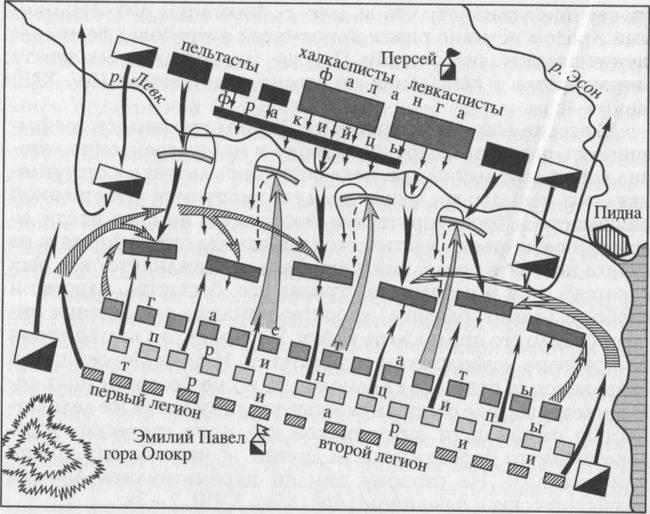
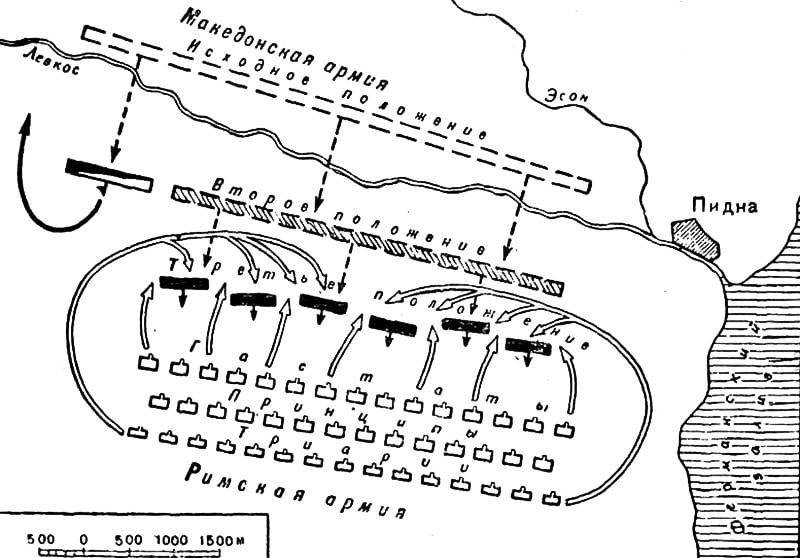
At about 15 p.m., the phalanx moved forward, and its blow turned out to be truly terrible: the advanced lines of the Roman hastati were simply demolished, and then the second line of principles. The offensive of the agema guards also developed successfully. The Romans slowly retreated to the hill of Alcor, and Aemilius Paul even tore his tunic. Plutarch reports:
However, the further movement of the phalanx over rough terrain led to breaks in its formation. Noticing this, the Roman commander ordered to attack the phalanx in the places of these gaps. In the conditions of close combat, the sarissas of the phalanx warriors became useless, and the short daggers with which they were armed were inferior to Roman swords. And the right-flank detachments of the light infantry of the Macedonians and Thracians were put to flight by the attack of war elephants, which gave the Romans the opportunity to hit the flank of the phalanx.
The Macedonian infantrymen retreating to the sea were attacked by the sailors of the approaching Roman fleet. Perseus tried to turn the tide by leading an attack by mounted units. It turned out to be unsuccessful, the king was wounded and left the battlefield along with his hetairoi. Other cavalry units followed them. The infantry left without support was doomed.
It is believed that the Macedonians lost up to 20 thousand people killed and about 11 thousand wounded. Modern historians estimate the losses of the Romans at a thousand people. Perseus fled to the island of Samothrace, later he surrendered.
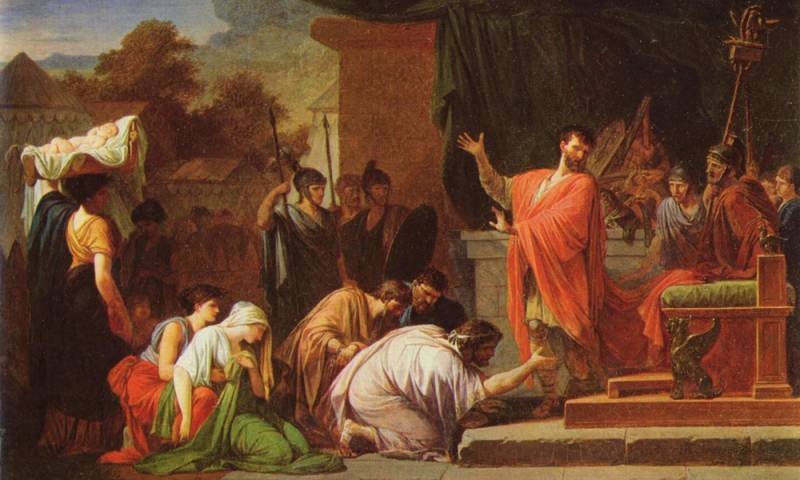
Jean-Franco-Pierre Peyron. Lucius Aemilius Paul and Perseus of Macedon
The former king was brought to Rome, during the triumph of Paul Aemilius, he followed his wagon.
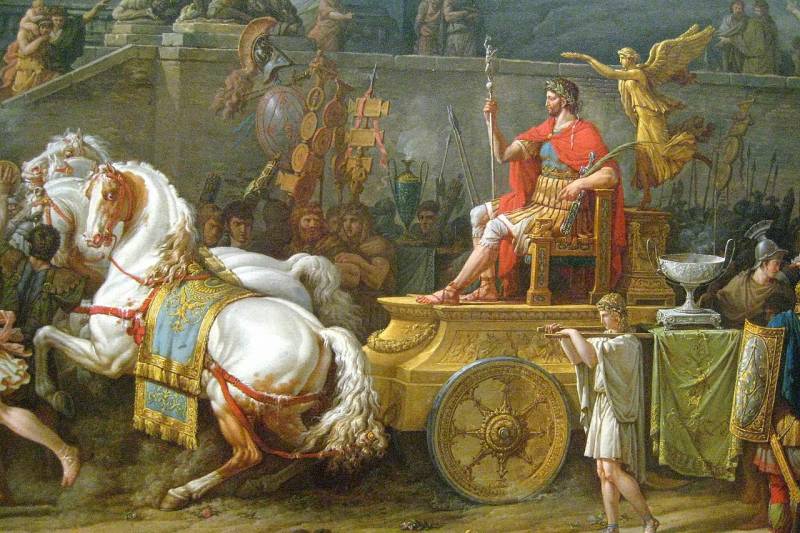
K. Vernet. Triumph of Aemilius Paulus (detail)
The Macedonian army ceased to exist, the cities opened the gates to the Romans.
It must be said that part of the wealth inherited by Alexander's army during its Asian campaign ended up in Macedonia. Later kings were, as a rule, very zealous people. They did not squander this wealth, but even increased it, Macedonia was then a rather rich country. There were so many treasures looted by Aemilius Paul that they had to be transported around Rome during the triumph for 3 days, and for some time the poll tax from Roman citizens was canceled. Aemilius Paul received the honorary title of Macedonian, and a monument was erected in his honor at Delphi.
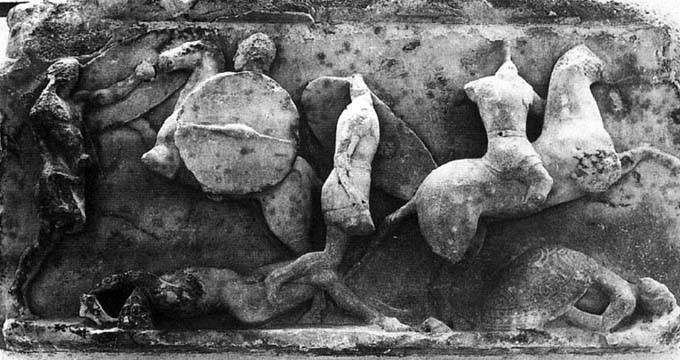
Fragment of the frieze "Monument of Aemilius Paul" in Delphi depicting the Battle of Pydna
And Macedonia was divided into four "unions of cities", which were supposed to pay tribute to Rome. It is curious that the Romans forbade marriages between residents of different Macedonian "unions", as well as buying houses and other real estate in neighboring districts. The officials of King Perseus were resettled in Italy, an attempt to return to their homeland was punishable by death. Allied Macedonia Illyria was also divided into three parts. But Epirus was subjected to the most terrible repressions. Up to 150 thousand Epirotes were sold into slavery, and the Molossian tribe, to which the famous opponent of Rome Pyrrhus belonged, was literally slaughtered and ceased to exist.
Repressions against the allies of Perseus were also carried out in the policies of Greece, albeit on a smaller scale. More than a thousand Hellenes from different cities were sent to Rome as hostages. Among them was the famous historian Polybius, who, by the way, believed that it was after the battle of Pydna that the world domination of the Romans began.
Macedonia (together with Illyria and Epirus) lost even the pitiful remnants of independence after the anti-Roman uprising - in 148 BC. e. And in 146 BC. e. fell and was destroyed by the main rival of the Roman Republic - Carthage. In the same year, the cities of the Achaean Union, including Sparta, lost their independence.
Information